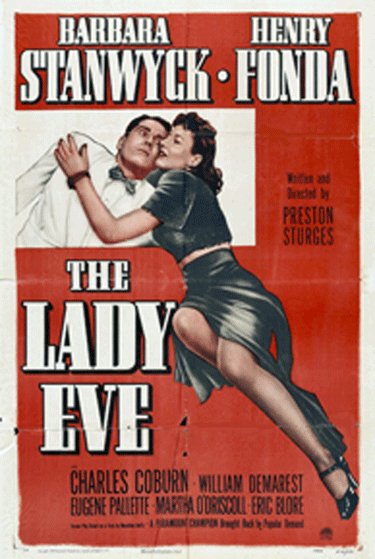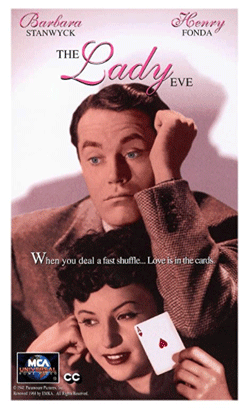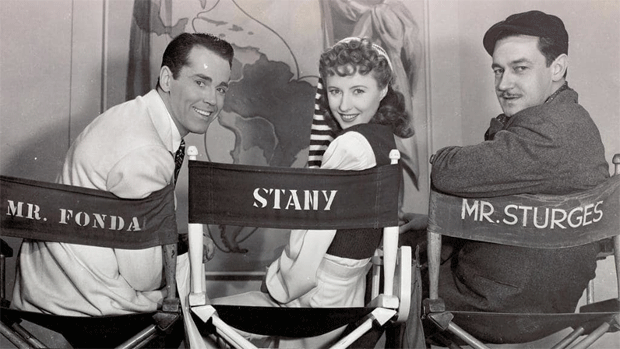 
So, there you are with a library of films,
including some favorites that may or may not have hit your home screen
during this pandemic lockdown.
Last month in a weekend edition we listed
some aviation-themed film favorites.
This week we want to share the movies of
a person you probably don’t know, but should.
If you can get into the movies of Preston
Sturges, they will make you laugh.
Laughter is a gift that all of us could
use right now, so suspend disbelief and call this Christmas in early May.
“Preston Sturges brought a high style
to low comedy,” said The New Yorker in 1998, and that might
be the best description of this pioneering 1940s script writer-turned-movie
director.
Film buffs have also made the comparison
that “Sturges is to comedy what John Ford is to western movies.”
Here is a real—albeit uncommon outside
a certain circle—genius of the movies.
Before Woody Allen and Frank Capra, in 1940
Preston Sturges put out a film titled The Great McGinty with
the screen credit “Written and Directed by Preston Sturges!”
That credit line was the first time in the
history of talking motion pictures that the passive verb had appeared
onscreen.
From 1940 until 1948, Sturges directed eleven
features. In just the first five years he created seven immortal movies
including The Great McGinty and Christmas in July (1940), The Lady Eve (1941), Sullivan’s Travels (1941), The Palm Beach Story (1942), and The Miracle of Morgan’s
Creek and Hail the Conquering Hero (1944).
Perhaps I have a particular fondness for
movies that were made the year I was born, but you probably also liked
this film without realizing who made it. Here is an introduction to the
work of Preston Sturges via The Lady Eve from 1941.

To View The Lady Eve trailer click here. To view the film click image or click here.
Eve was lauded as the “best movie” of 1941
by the New York Times.
No small accolade, as 1941 included the
movies Citizen Kane and How Green Was My Valley, two
films that today are widely regarded as among the best movies ever made.
The Lady Eve stars Henry Fonda
in a rare comedic turn as Charles, a somewhat bewildered millionaire who
fears women and collects snakes.
The snakes remind us of the garden of Eden,
and the movie twists and turns to serve up the lady Eve as a similar metaphor.
On board a ship, Jean (Barbara Stanwyck),
a hustler, looks to hook up with Charles to get his attention and his
cash.
The joke here is that Jean finds herself
falling for her mark.
But Charles discovers her true calling and
rejects her.
Later, she makes another run at Charles,
disguised as an English aristocrat named Eve (of course) and humiliates
him. Then, after another identity switch, she has no other option but
to fall for him all over again.
Does it sound muddled, not to say harebrained?
Well, guess what? Despite all the twists and turns, The Lady Eve is a model of clarity.
 |
“What The Lady Eve happens
to clarify,” wrote film critic Anthony Lane, in a brilliant profile
of Sturges published in The New Yorker in 1998, “is that
people are liable to mislay their hearts as easily as their wallets, and—just
in case you are tempted to construe such a loss as romantic—that
both can be swiftly retrieved.”
What sets Sturges movies apart is the dialogue.
“Often a bewildering balance: on the
one hand, a chin-up, all-American assumption that dreams are right there
within reach, like apples; on the other, a slightly alien cynicism toward
such rosiness, and a heavy hint that the fruit, once tasted, may prove
not to have been worth the plucking.
“By comparison Frank Capra comedies
from the same era like It’s a Wonderful Life dwell on the
gentle irony that the perfection you seek may have been sitting in your
own home all along—and that, Sturges would contend, is the problem
with perfection,” Lane contends.
Preston Sturges movies were screwball comedies.
Just note how many times Fonda takes a pratfall
during this film.
From the moment he enters the movie, stepping
off a motor launch onto the ship where Stanwick, standing above him on
the rail, drops an apple on his head, “the Sturges magic is a bracing
tonic against the sentimental.”
During the 1940s, seven of the eleven movies
Preston Sturges made were huge hits.
But then Sturges stopped making movies.
Some people who know about these things, like film historian Peter Bogdanovich
(who directed the all-time classic comedy Paper Moon) have indicated
that Sturges may have just burned himself out.
Film critic Andrew Sarris said of Sturges:
“Most screen writers could write for
five or even six people, Sturges could write good lines for 25 people
in a picture.
“The variety contrasting of characters
was always extraordinary so that maybe the 14th person in a scene, someone
you never heard of, would deliver the funniest line.
“He had a sense of otherness, as no
other comic director or writer (before or since) in Hollywood has ever
had.”
“Modern viewers, unschooled in the
lean lessons of the 1930s Depression, are more wary of Preston Sturges’
knowledgeable comedy, as if it cuts too close to the bone,” Anthony
Lane noted.
But now all of us in almost every corner
of the world are locked down in place at home by a terrible depression
of our way of life, not to mention of our jobs and livelihood. Sturges
films might be just the ticket, methinks, an edge as we come back from
the brink, to exhale and laugh as we move forward to the future.
So, buckle up and if you cannot make our
link here work, my hope is that you will go watch The Lady Eve on Amazon streaming, or Google around to find some Preston Sturges offerings.
Geoffrey |





